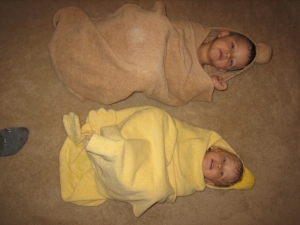“Hah ahm stenly,” he said, shaking my hand with what must have been a bionic appendage. His fingers were like miniature coils of steel cable.
The first time I spoke with Stanley, who was the gardener at Rocketer (which is the name of the estate on which our little cottage was located), I could hardly understand a word he said. His Welsh accent had so many meandering sounds that listening to him was like trying to write out the movements of a stream. Think Alex Ferguson from Manchester United, but with marbles in his mouth.
He was showing me where I could find cut up logs to split for firewood. He even gave me access to his axe and wedge and the shed where he dumped all the cut-but-not-split wood. I discovered that I could understand him better if I squinted and turned my head slightly to one side. He was a nice man. He probably thought I was a little touched, what with the squinting and head-turning and all.
“Chust doont cuh-ulf yrrr fult,” he said over his shoulder, laughing.
* * * * *
The whole reason I was even chopping wood was due to another half-misunderstood conversation. After we had been living in our quaint little drafty cottage for a few months the utility folks called, asking how we wanted to pay for the first quarter’s worth of electricity we used.
“How much do we owe?”
“480 pounds.”
“I’m sorry, it sounded like you said 480 pounds.”
“Ah did. Four hundred and eighty pounds.”
Ouch. We had just moved to England. We still did the conversion with every pound we spent. Four hundred eighty pounds was equal to about $750.
“Would you like to pay in installments?” the kind lady asked.
Yes please.
* * * * *
“It’s got to be those electric baseboard heaters,” Maile said. She was right.
“We’ll have to use that thing,” I said, pointing to the furnace in the wall. “And that thing,” I said, beckoning to the fireplace in the front room. So off I went to find the wood that our landlord had so graciously offered us months ago. Which is when I met Stanley. And he told me to “just don’t cut off your foot.”
* * * * *
That night we switched off the baseboard heaters and got the fire in the furnace cranking. So hot, in fact, that it heated up all the radiators in the house to scalding levels. So hot, that I had to get up in the middle of the night and open most of the windows, let in the winter before the entire cottage floated away like a hot-air balloon.
Then, when we woke in the morning, we could see our breath in clouds. We shivered our way downstairs and lit the fire again, crouching beside it, shivering.
“Wood burns too fast,” I said, my teeth chattering. “We need coal.”
* * * * *
To read other stories from our time in England, click HERE.




